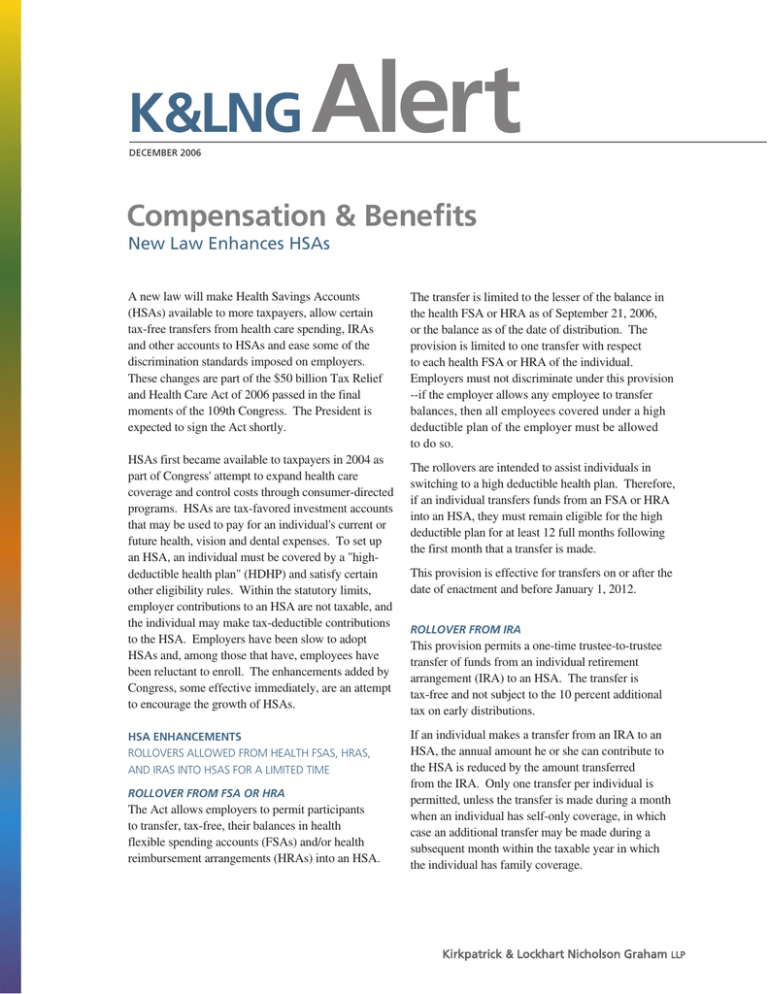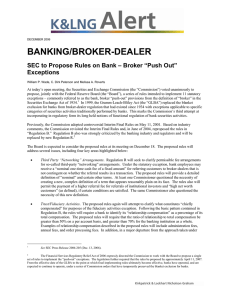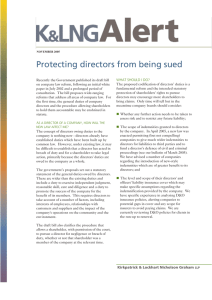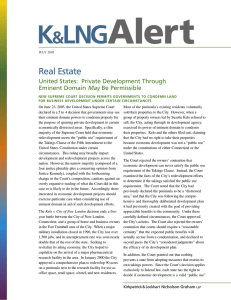
K&LNG
DECEMBER 2006
Alert
Compensation & Benefits
New Law Enhances HSAs
A new law will make Health Savings Accounts
(HSAs) available to more taxpayers, allow certain
tax-free transfers from health care spending, IRAs
and other accounts to HSAs and ease some of the
discrimination standards imposed on employers.
These changes are part of the $50 billion Tax Relief
and Health Care Act of 2006 passed in the final
moments of the 109th Congress. The President is
expected to sign the Act shortly.
HSAs first became available to taxpayers in 2004 as
part of Congress' attempt to expand health care
coverage and control costs through consumer-directed
programs. HSAs are tax-favored investment accounts
that may be used to pay for an individual's current or
future health, vision and dental expenses. To set up
an HSA, an individual must be covered by a "highdeductible health plan" (HDHP) and satisfy certain
other eligibility rules. Within the statutory limits,
employer contributions to an HSA are not taxable, and
the individual may make tax-deductible contributions
to the HSA. Employers have been slow to adopt
HSAs and, among those that have, employees have
been reluctant to enroll. The enhancements added by
Congress, some effective immediately, are an attempt
to encourage the growth of HSAs.
HSA ENHANCEMENTS
ROLLOVERS ALLOWED FROM HEALTH FSAS, HRAS,
AND IRAS INTO HSAS FOR A LIMITED TIME
ROLLOVER FROM FSA OR HRA
The Act allows employers to permit participants
to transfer, tax-free, their balances in health
flexible spending accounts (FSAs) and/or health
reimbursement arrangements (HRAs) into an HSA.
The transfer is limited to the lesser of the balance in
the health FSA or HRA as of September 21, 2006,
or the balance as of the date of distribution. The
provision is limited to one transfer with respect
to each health FSA or HRA of the individual.
Employers must not discriminate under this provision
--if the employer allows any employee to transfer
balances, then all employees covered under a high
deductible plan of the employer must be allowed
to do so.
The rollovers are intended to assist individuals in
switching to a high deductible health plan. Therefore,
if an individual transfers funds from an FSA or HRA
into an HSA, they must remain eligible for the high
deductible plan for at least 12 full months following
the first month that a transfer is made.
This provision is effective for transfers on or after the
date of enactment and before January 1, 2012.
ROLLOVER FROM IRA
This provision permits a one-time trustee-to-trustee
transfer of funds from an individual retirement
arrangement (IRA) to an HSA. The transfer is
tax-free and not subject to the 10 percent additional
tax on early distributions.
If an individual makes a transfer from an IRA to an
HSA, the annual amount he or she can contribute to
the HSA is reduced by the amount transferred
from the IRA. Only one transfer per individual is
permitted, unless the transfer is made during a month
when an individual has self-only coverage, in which
case an additional transfer may be made during a
subsequent month within the taxable year in which
the individual has family coverage.
Kirkpatrick & Lockhart Nicholson Graham LLP
The rollover amount will be included in gross income
and subject to the 10 percent excise tax if the
individual ceases to be eligible for the high deductible
health plan during the testing period (which starts
with the month of the rollover and ends on the last
day of the twelfth month following that month).
This provision is effective for taxable years
beginning in 2007.
FSA GRACE PERIOD MAY NOT PREVENT HSA
ELIGIBILITY
The Act eases the transition for employees moving
to an HSA who were covered in a health care flexible
spending account ("FSA"). Generally, an individual
may not participate in both an HSA and an FSA
because FSA coverage is not a high deductible health
plan. According to the IRS, this restriction continues
during any "grace period" after the end of the plan
year during which unused FSA amounts are available
to pay new medical expenses, even if there was
no money left in the FSA. Under the new law,
individuals with a zero balance in their FSA at yearend may contribute to an HSA at the start of the new
year. Also, an individual with funds remaining in his
or her FSA may transfer the FSA balance into an
HSA on a tax-free basis.
This provision is effective for taxable years
beginning in 2007.
FULL-YEAR CONTRIBUTION ALLOWED FOR
MID-YEAR ENROLLEES
This provision allows individuals who first enroll in
a high deductible plan after the start of the year to
make a full HSA contribution for the year. However,
if the individual does not remain eligible for the highdeductible plan during the testing period (the period
beginning with the last month of the taxable year and
ending on the last day of the twelfth month following
such month), then an amount equal to the HSA
deduction during the period that the individual was
treated as eligible is included in income, and an
additional 10% tax applies to the amount includable.
This provision is effective for taxable years
beginning in 2007.
EMPLOYERS MAY MAKE LARGER CONTRIBUTIONS
FOR NHCES
Employers will now be permitted to make larger
HSA contributions for non-highly compensated
employees (NHCEs) than for highly compensated
employees (HCEs). Basically, for 2007, an employee
is an NHCE if he or she earned less than $100,000 in
2006. If an employer makes a contribution for one
NHCE, the employer must make comparable
contributions on behalf of all NHCEs with
comparable coverage during the same period.
This provision is effective for taxable years
beginning in 2007.
REPEAL OF ANNUAL PLAN DEDUCTION LIMITATIONS
ON HSA CONTRIBUTION LIMITATION
Prior to this Act, an individual's maximum
contribution towards their HSA was tied to that plan's
annual deductible. This provision removes that
limitation and sets a maximum aggregate annual
contribution to HSAs of $2,850 for individuals and
$5,650 for family coverage in 2007.
Stacy H. Barrow
sbarrow@klng.com
617.951.9178
David E. Morse
This provision is effective for taxable years
beginning in 2007.
dmorse@klng.com
212.536.3998
EARLIER NOTICE OF COST OF LIVING ADJUSTMENTS
The Treasury Department will make future cost of
living adjustments to the contribution limits and
HDHP requirements by June 1st of the preceding
year.
If you would like to receive our future Compensation & Benefits
Alerts by e-mail, please use our online sign-up form.
This provision is effective for taxable years
beginning in 2008.
2
Kirkpatrick & Lockhart Nicholson Graham
LLP
| DECEMBER 2006
If you have questions about this topic or would like more information on Kirkpatrick & Lockhart Nicholson Graham’s Compensation
and Benefits practice, please contact one of our lawyers listed below:
PITTSBURGH
BOSTON
Peter J. Marathas, Jr.
Stephen E. Moore
Charles A. Grace
617.951.9072 pmarathas@klng.com
617.951.9191 smoore@klng.com
617.951.9073 cgrace@klng.com
LOS ANGELES
William P. Wade
310.552.5071 wwade@klng.com
412.355.8600
412.355.6211
412.355.6454
412.355.6536
412.355.8676
412.355.8375
wcullen@klng.com
mhart@klng.com
rlauver@klng.com
csmith@klng.com
rwood@klng.com
dellis@klng.com
202.778.9289
202.778.9887
202.778.9373
202.778.9024
202.778.9210
cbardsley@klng.com
dpickle@klng.com
william.schmidt@klng.com
lgalletto@klng.com
bmcparland@klng.com
WASHINGTON
NEW YORK
David E. Morse
William T. Cullen
Michael A. Hart
J. Richard Lauver
Charles R. Smith
Richard E. Wood
Douglas J. Ellis
212.536.3998 dmorse@klng.com
Catherine S. Bardsley
David E. Pickle
William A. Schmidt
Lori G. Galletto
Brendan S. McParland
www.klng.com
BOSTON • DALLAS • HARRISBURG • LONDON • LOS ANGELES • MIAMI • NEWARK • NEW YORK • PALO ALTO • PITTSBURGH • SAN FRANCISCO • WASHINGTON
Kirkpatrick & Lockhart Nicholson Graham (K&LNG) has approximately 1,000 lawyers and represents entrepreneurs, growth and middle market companies, capital
markets participants, and leading FORTUNE 100 and FTSE 100 global corporations nationally and internationally.
K&LNG is a combination of two limited liability partnerships, each named Kirkpatrick & Lockhart Nicholson Graham LLP, one qualified in Delaware, U.S.A. and
practicing from offices in Boston, Dallas, Harrisburg, Los Angeles, Miami, Newark, New York, Palo Alto, Pittsburgh, San Francisco and Washington and one
incorporated in England practicing from the London office.
This publication/newsletter is for informational purposes and does not contain or convey legal advice. The information herein should not be used or relied upon in
regard to any particular facts or circumstances without first consulting a lawyer.
Data Protection Act 1988—We may contact you from time to time with information on Kirkpatrick & Lockhart Nicholson Graham LLP seminars and with our regular
newsletters, which may be of interest to you. We will not provide your details to any third parties. Please e-mail london@klng.com if you would prefer not to receive
this information.
© 2006 KIRKPATRICK & LOCKHART NICHOLSON GRAHAM LLP. ALL RIGHTS RESERVED.





